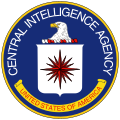John N. McMahon | |
|---|---|
| 15th Deputy Director of Central Intelligence | |
| In office April 27, 1982 –March 26, 1986 | |
| President | Ronald Reagan |
| Preceded by | Bobby Ray Inman |
| Succeeded by | Robert Gates |
| Personal details | |
| Born | John Norman McMahon July 3,1929 |
| Spouse | Margaret Joan Hugger (m. 1952) |
| Children | 4 |
| Parents |
|
| Education | College of Holy Cross |
| Military service | |
| Allegiance | |
John N. McMahon (born July 3, 1929) is a former senior U.S. official of the Central Intelligence Agency.
